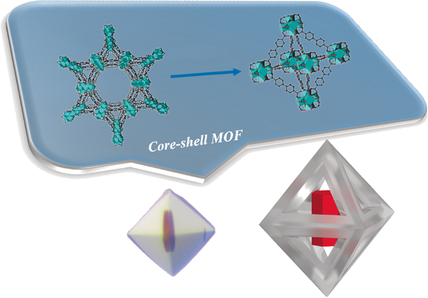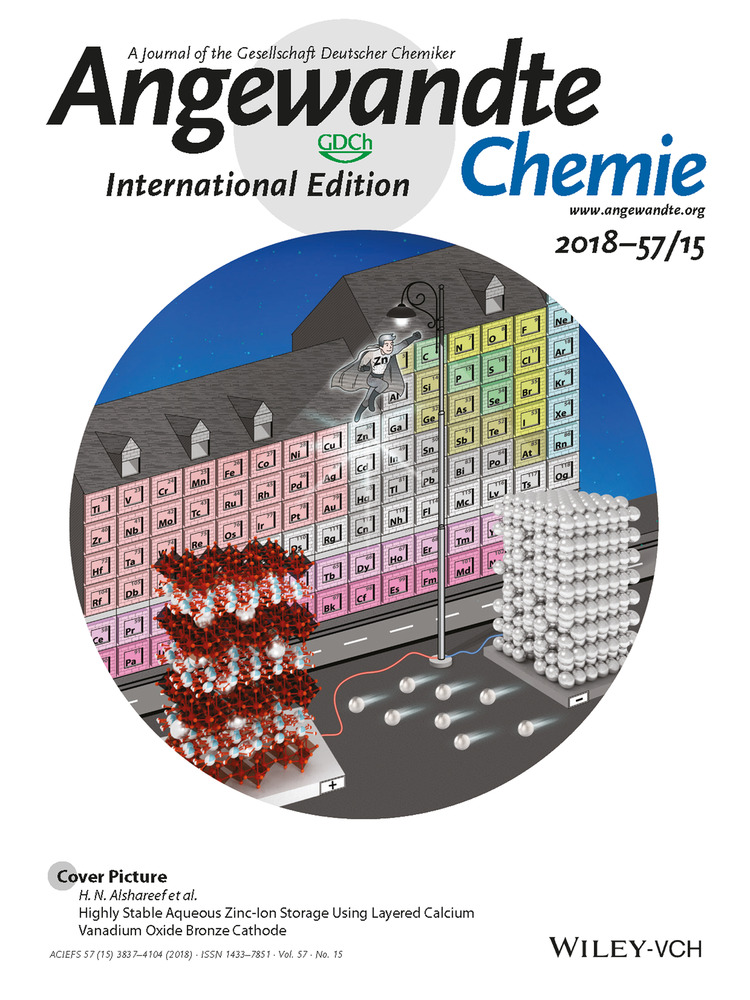One-Step Synthesis of Hybrid Core–Shell Metal–Organic Frameworks
Xinyu Yang
Department of Chemistry, Texas A&M University, USA
These authors contributed equally to this work.
Search for more papers by this authorShuai Yuan
Department of Chemistry, Texas A&M University, USA
These authors contributed equally to this work.
Search for more papers by this authorDr. Lanfang Zou
Department of Chemistry, Texas A&M University, USA
Search for more papers by this authorHannah Drake
Department of Chemistry, Texas A&M University, USA
Search for more papers by this authorYingmu Zhang
Department of Chemistry, Texas A&M University, USA
Search for more papers by this authorDr. Junsheng Qin
Department of Chemistry, Texas A&M University, USA
Search for more papers by this authorDr. Ali Alsalme
Department of Chemistry, College of Science, King Saud University, Saudi Arabia
Search for more papers by this authorCorresponding Author
Dr. Hong-Cai Zhou
Department of Chemistry, Texas A&M University, USA
Department of Materials Science and Engineering, Texas A&M University, USA
Search for more papers by this authorXinyu Yang
Department of Chemistry, Texas A&M University, USA
These authors contributed equally to this work.
Search for more papers by this authorShuai Yuan
Department of Chemistry, Texas A&M University, USA
These authors contributed equally to this work.
Search for more papers by this authorDr. Lanfang Zou
Department of Chemistry, Texas A&M University, USA
Search for more papers by this authorHannah Drake
Department of Chemistry, Texas A&M University, USA
Search for more papers by this authorYingmu Zhang
Department of Chemistry, Texas A&M University, USA
Search for more papers by this authorDr. Junsheng Qin
Department of Chemistry, Texas A&M University, USA
Search for more papers by this authorDr. Ali Alsalme
Department of Chemistry, College of Science, King Saud University, Saudi Arabia
Search for more papers by this authorCorresponding Author
Dr. Hong-Cai Zhou
Department of Chemistry, Texas A&M University, USA
Department of Materials Science and Engineering, Texas A&M University, USA
Search for more papers by this authorGraphical Abstract
MOF-on-MOF: A series of core–shell MOFs with mismatching lattices has been synthesized under the guidance of nucleation kinetic analysis. Isoreticular expansion of microporous shells and orthogonal modification of the core was realized to produce multifunctional MOF composites, which act as size-selective catalysts for olefin epoxidation.
Abstract
Epitaxial growth of MOF-on-MOF composite is an evolving research topic in the quest for multifunctional materials. In previously reported methods, the core–shell MOFs were synthesized via a stepwise strategy that involved growing the shell-MOFs on top of the preformed core-MOFs with matched lattice parameters. However, the inconvenient stepwise synthesis and the strict lattice-matching requirement have limited the preparation of core–shell MOFs. Herein, we demonstrate that hybrid core–shell MOFs with mismatching lattices can be synthesized under the guidance of nucleation kinetic analysis. A series of MOF composites with mesoporous core and microporous shell were constructed and characterized by optical microscopy, powder X-ray diffraction, gas sorption measurement, and scanning electron microscopy. Isoreticular expansion of microporous shells and orthogonal modification of the core was realized to produce multifunctional MOF composites, which acted as size selective catalysts for olefin epoxidation with high activity and selectivity.
Supporting Information
As a service to our authors and readers, this journal provides supporting information supplied by the authors. Such materials are peer reviewed and may be re-organized for online delivery, but are not copy-edited or typeset. Technical support issues arising from supporting information (other than missing files) should be addressed to the authors.
| Filename | Description |
|---|---|
| anie201710019-sup-0001-misc_information.pdf2.1 MB | Supplementary |
Please note: The publisher is not responsible for the content or functionality of any supporting information supplied by the authors. Any queries (other than missing content) should be directed to the corresponding author for the article.
References
- 1
- 1aH.-C. Zhou, J. R. Long, O. M. Yaghi, Chem. Rev. 2012, 112, 673–674;
- 1bT. R. Cook, Y.-R. Zheng, P. J. Stang, Chem. Rev. 2013, 113, 734–777;
- 1cG. Férey, Chem. Soc. Rev. 2008, 37, 191–214;
- 1dS. Kitagawa, R. Kitaura, S.-i. Noro, Angew. Chem. Int. Ed. 2004, 43, 2334–2375; Angew. Chem. 2004, 116, 2388–2430;
- 1eH. Li, M. Eddaoudi, M. O'Keeffe, O. M. Yaghi, Nature 1999, 402, 276–279;
- 1fJ. R. Long, O. M. Yaghi, Chem. Soc. Rev. 2009, 38, 1213–1214.
- 2
- 2aO. K. Farha, A. Özgür Yazaydın, I. Eryazici, C. D. Malliakas, B. G. Hauser, M. G. Kanatzidis, S. T. Nguyen, R. Q. Snurr, J. T. Hupp, Nat. Chem. 2010, 2, 944–948;
- 2bS. S. Kaye, A. Dailly, O. M. Yaghi, J. R. Long, J. Am. Chem. Soc. 2007, 129, 14176–14177;
- 2cB. Li, H.-M. Wen, H. Wang, H. Wu, M. Tyagi, T. Yildirim, W. Zhou, B. Chen, J. Am. Chem. Soc. 2014, 136, 6207–6210;
- 2dS. Ma, H.-C. Zhou, Chem. Commun. 2010, 46, 44–53.
- 3
- 3aT.-H. Bae, J. S. Lee, W. Qiu, W. J. Koros, C. W. Jones, S. Nair, Angew. Chem. Int. Ed. 2010, 49, 9863–9866; Angew. Chem. 2010, 122, 10059–10062;
- 3bD. Britt, H. Furukawa, B. Wang, T. G. Glover, O. M. Yaghi, Proc. Natl. Acad. Sci. USA 2009, 106, 20637–20640;
- 3cJ. R. Li, D. J. Timmons, H. C. Zhou, J. Am. Chem. Soc. 2009, 131, 6368–6369;
- 3dF. Luo, C. Yan, L. Dang, R. Krishna, W. Zhou, H. Wu, X. Dong, Y. Han, T.-L. Hu, M. O'Keeffe, L. Wang, M. Luo, R.-B. Lin, B. Chen, J. Am. Chem. Soc. 2016, 138, 5678–5684;
- 3eT. Rodenas, I. Luz, G. Prieto, B. Seoane, H. Miro, A. Corma, F. Kapteijn, F. X. Llabrés i Xamena, J. Gascon, Nat. Mater. 2015, 14, 48–55.
- 4
- 4aM. I. Gonzalez, E. D. Bloch, J. A. Mason, S. J. Teat, J. R. Long, Inorg. Chem. 2015, 54, 2995–3005;
- 4bK. Manna, T. Zhang, F. X. Greene, W. Lin, J. Am. Chem. Soc. 2015, 137, 2665–2673;
- 4cC.-D. Wu, A. Hu, L. Zhang, W. Lin, J. Am. Chem. Soc. 2005, 127, 8940–8941;
- 4dM. Yoon, R. Srirambalaji, K. Kim, Chem. Rev. 2012, 112, 1196–1231;
- 4eX. Zhang, Z. Zhang, J. Boissonnault, S. M. Cohen, Chem. Commun. 2016, 52, 8585–8588.
- 5
- 5aB. Chen, Y. Yang, F. Zapata, G. Lin, G. Qian, E. B. Lobkovsky, Adv. Mater. 2007, 19, 1693–1696;
- 5bZ. Guo, H. Xu, S. Su, J. Cai, S. Dang, S. Xiang, G. Qian, H. Zhang, M. O'Keeffe, B. Chen, Chem. Commun. 2011, 47, 5551–5553;
- 5cF. Luo, S. R. Batten, Dalton Trans. 2010, 39, 4485–4488;
- 5dX. Zhu, H. Zheng, X. Wei, Z. Lin, L. Guo, B. Qiu, G. Chen, Chem. Commun. 2013, 49, 1276–1278.
- 6
- 6aJ. A. Hurd, R. Vaidhyanathan, V. Thangadurai, C. I. Ratcliffe, I. L. Moudrakovski, G. K. H. Shimizu, Nat. Chem. 2009, 1, 705–710;
- 6bG. K. H. Shimizu, J. M. Taylor, S. Kim, Science 2013, 341, 354–355.
- 7
- 7aY. Cui, Y. Yue, G. Qian, B. Chen, Chem. Rev. 2012, 112, 1126–1162;
- 7bD. Ma, B. Li, X. Zhou, Q. Zhou, K. Liu, G. Zeng, G. Li, Z. Shi, S. Feng, Chem. Commun. 2013, 49, 8964–8966;
- 7cH. Xu, F. Liu, Y. Cui, B. Chen, G. Qian, Chem. Commun. 2011, 47, 3153–3155.
- 8
- 8aJ. Della Rocca, D. Liu, W. Lin, Acc. Chem. Res. 2011, 44, 957–968;
- 8bP. Horcajada, T. Chalati, C. Serre, B. Gillet, C. Sebrie, T. Baati, J. F. Eubank, D. Heurtaux, P. Clayette, C. Kreuz, J.-S. Chang, Y. K. Hwang, V. Marsaud, P.-N. Bories, L. Cynober, S. Gil, G. Ferey, P. Couvreur, R. Gref, Nat. Mater. 2010, 9, 172–178;
- 8cP. Horcajada, C. Serre, G. Maurin, N. A. Ramsahye, F. Balas, M. Vallet-Regí, M. Sebban, F. Taulelle, G. Férey, J. Am. Chem. Soc. 2008, 130, 6774–6780;
- 8dJ. Park, Q. Jiang, D. Feng, L. Mao, H.-C. Zhou, J. Am. Chem. Soc. 2016, 138, 3518–3525;
- 8eJ.-S. Qin, D.-Y. Du, W.-L. Li, J.-P. Zhang, S.-L. Li, Z.-M. Su, X.-L. Wang, Q. Xu, K.-Z. Shao, Y.-Q. Lan, Chem. Sci. 2012, 3, 2114–2118.
- 9
- 9aH. Deng, C. J. Doonan, H. Furukawa, R. B. Ferreira, J. Towne, C. B. Knobler, B. Wang, O. M. Yaghi, Science 2010, 327, 846–850;
- 9bQ. Liu, H. Cong, H. Deng, J. Am. Chem. Soc. 2016, 138, 13822–13825.
- 10
- 10aT.-F. Liu, L. Zou, D. Feng, Y.-P. Chen, S. Fordham, X. Wang, Y. Liu, H.-C. Zhou, J. Am. Chem. Soc. 2014, 136, 7813–7816;
- 10bZ. Wang, S. M. Cohen, J. Am. Chem. Soc. 2007, 129, 12368–12369;
- 10cZ. Wang, S. M. Cohen, Chem. Soc. Rev. 2009, 38, 1315–1329;
- 10dS. Yuan, Y.-P. Chen, J.-S. Qin, W. Lu, L. Zou, Q. Zhang, X. Wang, X. Sun, H.-C. Zhou, J. Am. Chem. Soc. 2016, 138, 8912–8919;
- 10eS. Yuan, L. Zou, H. Li, Y.-P. Chen, J. Qin, Q. Zhang, W. Lu, M. B. Hall, H.-C. Zhou, Angew. Chem. Int. Ed. 2016, 55, 10776–10780; Angew. Chem. 2016, 128, 10934–10938.
- 11
- 11aY.-Y. Fu, C.-X. Yang, X.-P. Yan, Chem. Eur. J. 2013, 19, 13484–13491;
- 11bP. Hu, J. V. Morabito, C.-K. Tsung, ACS Catal. 2014, 4, 4409–4419;
- 11cM. Jahan, Q. Bao, K. P. Loh, J. Am. Chem. Soc. 2012, 134, 6707–6713;
- 11dG. Lu, S. Li, Z. Guo, O. K. Farha, B. G. Hauser, X. Qi, Y. Wang, X. Wang, S. Han, X. Liu, J. S. DuChene, H. Zhang, Q. Zhang, X. Chen, J. Ma, S. C. J. Loo, W. D. Wei, Y. Yang, J. T. Hupp, F. Huo, Nat. Chem. 2012, 4, 310–316;
- 11eJ. V. Morabito, L.-Y. Chou, Z. Li, C. M. Manna, C. A. Petroff, R. J. Kyada, J. M. Palomba, J. A. Byers, C.-K. Tsung, J. Am. Chem. Soc. 2014, 136, 12540–12543;
- 11fN. Stock, S. Biswas, Chem. Rev. 2012, 112, 933–969;
- 11gQ.-L. Zhu, Q. Xu, Chem. Soc. Rev. 2014, 43, 5468–5512.
- 12M. Zhao, K. Yuan, Y. Wang, G. Li, J. Guo, L. Gu, W. Hu, H. Zhao, Z. Tang, Nature 2016, 539, 76–80.
- 13
- 13aS. Choi, T. Kim, H. Ji, H. J. Lee, M. Oh, J. Am. Chem. Soc. 2016, 138, 14434–14440;
- 13bS. Furukawa, K. Hirai, K. Nakagawa, Y. Takashima, R. Matsuda, T. Tsuruoka, M. Kondo, R. Haruki, D. Tanaka, H. Sakamoto, S. Shimomura, O. Sakata, S. Kitagawa, Angew. Chem. Int. Ed. 2009, 48, 1766–1770; Angew. Chem. 2009, 121, 1798–1802;
- 13cK. Koh, A. G. Wong-Foy, A. J. Matzger, Chem. Commun. 2009, 6162–6164;
- 13dT. Li, J. E. Sullivan, N. L. Rosi, J. Am. Chem. Soc. 2013, 135, 9984–9987;
- 13eK. Hirai, S. Furukawa, M. Kondo, M. Meilikhov, Y. Skata, O. Skata, S. Kitagawa, Chem. Commun. 2012, 48, 6472–6474;
- 13fL. Wang, W. Yang, Y. Li, Z. Xie, W. Zhu, Z. M. Sun, Chem. Commun. 2014, 50, 11653–11656;
- 13gJ. A. Boissonnault, A. G. Wong-Foy, A. J. Matzger, J. Am. Chem. Soc. 2017, 139, 14841–14844.
- 14D. Feng, Z.-Y. Gu, J.-R. Li, H.-L. Jiang, Z. Wei, H.-C. Zhou, Angew. Chem. Int. Ed. 2012, 51, 10307–10310; Angew. Chem. 2012, 124, 10453–10456.
- 15W. Zhang, E. N. Jacobsen, J. Org. Chem. 1991, 56, 2296–2298.
- 16S. Yuan, J.-S. Qin, L. Zou, Y.-P. Chen, X. Wang, Q. Zhang, H.-C. Zhou, J. Am. Chem. Soc. 2016, 138, 6636–6642.
- 17R. Wang, Z. Wang, Y. Xu, F. Dai, L. Zhang, D. Sun, Inorg. Chem. 2014, 53, 7086–7088.
- 18D. X. Xue, A. J. Cairns, Y. Belmabkhout, L. Wojtas, Y. Liu, M. H. Alkordi, M. Eddaoudi, J. Am. Chem. Soc. 2013, 135, 7660–7667.





